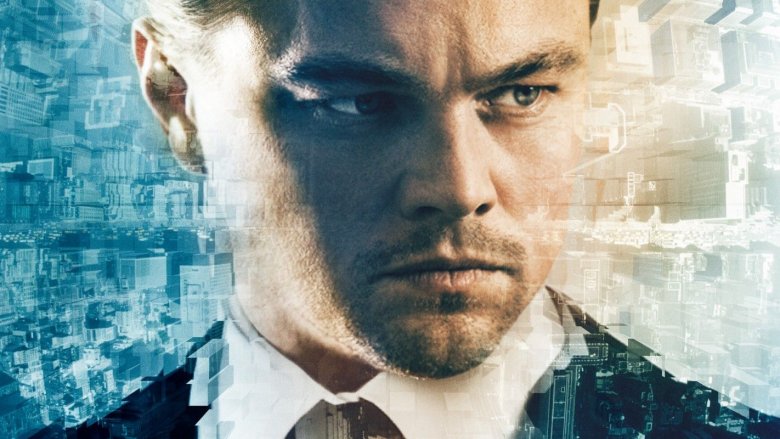Inception Actor Finally Reveals The Truth Behind The Film's Ending
The enigmas of Christopher Nolan's sci-fi action thriller Inception have long plagued movie-lovers. Now, thanks to Inception star Michael Caine, we have the truth behind the ambiguous ending that's left fans scratching their heads for the better part of a decade.
When the film, which stars Leonardo DiCaprio as professional thief and expert secret-stealer Dominick "Dom" Cobb, debuted in July of 2010, it was seemingly all anyone could talk about. The one question no one could answer, however, was what really happened at the end of Inception.
After DiCaprio's Cobb returns home to his children, he spins a top — his late wife Mal's (Marion Cotillard) "totem," an object dreamers use to distinguish between reality and fantasy — on the table to test whether he's in the real world or still trapped under layers of a dream. If his sweet homecoming is real, the top will spin and then topple; if it's all an elaborate construction, Cobb's totem will twirl on into infinity.
Though it's evident that Cobb has carried out this test plenty of times before given how skilled he is at his job, when he conducts it in the final moments of the film, he chooses to walk away without seeing the result and instead reunites with his young children in the backyard. Cobb hugs the tiny tots, scooping his son up into a hug, while the camera pans back to the spinning top. Viewers watch as it rapidly rotates for a few seconds before teetering slightly — and then the film cuts to black.
So, what gives? Does Inception end in a dream or in reality?
According to Caine, it's the latter.
The actor revealed to Esquire during a recent screening of Inception in London that the key to determining whether the ending is real or just another dream lies in his character — Professor Stephen Miles, Cobb's mentor and father-in-law. Because Caine's Professor Miles is in the last scene in Inception — seen walking from the backyard with Cobb's children and into the house — Cobb isn't dreaming.
Caine explained, "When I got the script of Inception, I was a bit puzzled by it, and I said to [director Nolan], 'I don't understand where the dream is.' I said, 'When is it the dream and when is it reality?' He said, 'Well, when you're in the scene it's reality.' So, get that — if I'm in it, it's reality. If I'm not in it, it's a dream."
Prior to this reveal, fans crafted tons of incredibly detailed theories about the truth of Inception's ending. Some claimed Cobb's wedding ring is his real totem, and that because he wasn't wearing it in the closing scene, he wasn't dreaming, since it's only ever absent in reality. Others argued that Japanese businessman Mr. Saito (Ken Watanabe) is Cobb's true totem and serves to remind Cobb that his world isn't real.
Of course, there's been a great divide between those who think Cobb did actually see his children's smiling faces in real life and those who believe it was all one giant fabrication. But a few fans took speculation to the extreme, sticking by the idea that Inception isn't set in a dream or in reality but instead takes place inside Cobb's PTSD-affected mind as he struggles to death with Mal's suicide.
When it comes to addressing these theories, director Nolan has avoided giving a clear-cut answer.
In 2015, Nolan revisited the film's ending during a speech he gave to a Princeton University graduating class.
"I want to make the case to you that our dreams, our virtual realities, these abstractions that we enjoy and surround ourselves with — they are subsets of reality," Nolan stated (via The Hollywood Reporter). "The way the end of that film worked, Leonardo DiCaprio's character Cobb — he was off with his kids, he was in his own subjective reality. He didn't really care anymore, and that makes a statement: perhaps, all levels of reality are valid. The camera moves over the spinning top just before it appears to be wobbling, it was cut to black."
He continued, "The point is, objectively, it matters to the audience in absolute terms: even though when I'm watching, it's fiction, a sort of virtual reality. But the question of whether that's a dream or whether it's real is the question I've been asked most about any of the films I've made. It matters to people because that's the point about reality. Reality matters."
Yeah, that wasn't exactly the definitive response Inception fans were hoping to hear.
Earlier, in 2010, Nolan discussed the end of Inception with Wired, telling the outlet that he has an answer to what really went down. Though he wouldn't give it up, the director did explain his viewpoint on closing the film on such an ambivalent note.
"I've always believed that if you make a film with ambiguity, it needs to be based on a sincere interpretation. If it's not, then it will contradict itself, or it will be somehow insubstantial and end up making the audience feel cheated," he said.
Eight years, countless questions, and one reveal not from Nolan himself later, and the world can finally rest easy knowing both Inception fans got the answer and Cobb got the happy ending they each deserve.
